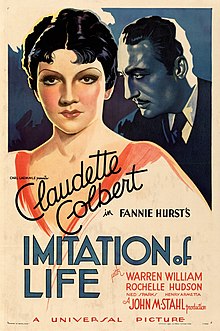The first, rather faithful screen version of Fannie Hurst’s popular novel, “Imitation to Life” was helmed by John Stahl, a director who specialized in lavish melodramas (“Leave Her to Heaven”) and women’s pictures (“Back Street,” “Magnificent Obsession”), extremely well acted by their protagonists.
Grade: B
| Imitation of Life | |
|---|---|

Theatrical release poster
|
|
Please read our review of the 1959 version of Imitation of Life
https://emanuellevy.com/wp-admin/post.php?post=103370&action=edit
Claudette Colbert plays Beatrice (Bea) Pullman, a young widow raising her single daughter, Jessie (Rochelle Hudson). Through accidental meeting with a black woman named Delilah Johnson (Louise Beaver), who’s also a widow and single mom raising a daughter, the two women join forces by opening a pancake parlor with Delilah as a business partner.
Spanning 15 years, the story covers the women’s successful enterprise, as well as their troubled family and personal lives. While Beatrice’s daughter Jessie goes through normal growing pains and not so normal romantic attachment to her mother’s beau, Delilah’s light-skinned daughter Peola (Fredi Washington) tries to pass as white, which breaks her mother’s heart and eventually causes her death.
Made during the height of the Depression, as the historian Donald Bogle pointed out, “Imitation of Life” prided itself for its liberal view and portrait of a black woman who had dignity and integrity, but the portrait of the interracial friendship was controversial and Louise Beavers’ interpretation was criticized by some journalists (both black and white).
Upon meeting the arrangement is that the black widow (Aunt Delilah) will take care of the house and the two children, while Miss Bea (as Delilah calls her) will be the breadwinner. At first, the two women suffer from the era’s realities of poverty and hunger. However, fortune comes their way in the form of a pancake recipe, passed down to Delilah for generations as a family secret. When Bea decides to market the pancake, she offers Delilah 24 percent interest in the business. “You’ll have your own car. Your own house,” Bea says.
Baffled by the offer, Delilah is utterly submissive: “My own house You gonna send me away, Miss Bea I can’t live with you Oh, honey chile, please don’t send me away, Miss Bea When asked if she doesn’t want her own house, Delilah explains: “No’m,” then adds, “I’s your cook. And I want to stay your cook.” Of the pancake recipe, Delilah says, “I gives it to you, honey. I makes you a present of it.”
Even back in 1934, critics pointed out that the dialogue was offensive (and racist) and that Delilah, a successful business woman, should have had her own residence.
In the movie, the two women remain lifelong friends and happy business partners: Delilah’s flour mix proves to be a huge success, bringing prosperity for both.
However, the financial prosperity comes at a heavy price of despair, isolation, and other emotional troubles caused by the widows’ respective daughters, issues that occupy the second, more melodramatic half of the narrative. Jessie becomes Her mother’s own rival in a love affair with Stephen Archer (Warren William). Delilah’s light-skinned daughter Peola suffers when she tries to pass as white. Originally, Peola was conceived as a tragic mulatto type, a beautiful girl doomed because she has “a drop of Negro blood.”
But as played by the beautiful black actress Fredi Washington, Peola became a major, haunted character and the story’s most complex and heartfelt figure. To obtain the same opportunities and rights as whites, she had to rebel against the system and try to pass as someone she was not.
A huge commercial hit, “Imitation of Life” was re-released several times in the 1940s and 1950s.
In what’s the best year of her career, Colbert also appeared in the starring roles in the Oscar-nominated “Cleopatra” and the Oscar-winning “It Happened One Night.”
My Oscar Book:
Oscar Nominations: 3
Picture, produced by John M. Stahl
Assistant Director: Scott Beal
Sound Recording: Theodore Soderberg
Oscar Context
Imitation of Life competed for the Best Picture with nine other films: The Barretts of Wimpole Street, Cleopatra, Flirtation Walk, The Gay Divorcee, Here Comes the Navy, The House of Rothchild, It Happened One Night, One Night of Love, The Thin Man, Viva Villa! and The White Parade.
It Happened One Night, Capra’s screwball comedy, swept most of the Oscars, including Best Picture.
Remake
Imitation of Life was stylishly remade in 1959 by Douglas Sirk, with Lana Turner in the Claudette Colbert role. This version became one of the most popular films in Universal’s history. (See Review)
Cast
Beatrice Pullman (Claudette Colbert)
Stephen Archer (Warren William)
Elmer (Ned Parks)
Delilah Johnson (Louise Beavers)
Jessie Pullman, age 3 (Juanita Quigley)
Jessie Pullman, age 8 (Marilyn Knowlden)
Jessie Pullman, age 18 (Rochelle Hudson)
Peola Johnson, age 4 (Sebie Hendricks)
Peola Johnson, age 9 (Dorothy Black)
Peopla Johnson, age 19 (Fredi Washington)
Credits:
Directed by John M. Stahl
Screenplay by William J. Hurlbut, based on Imitation of Life (novel) by Fannie Hurst
Produced by Carl Laemmle Jr.
Cinematography Merritt B. Gerstad
Edited by Philip Cahn, Maurice Wright
Music by Heinz Roemheld
Production and distribution: Universal Pictures
Release date: November 26, 1934 (US)
Running time: 111 minutes











